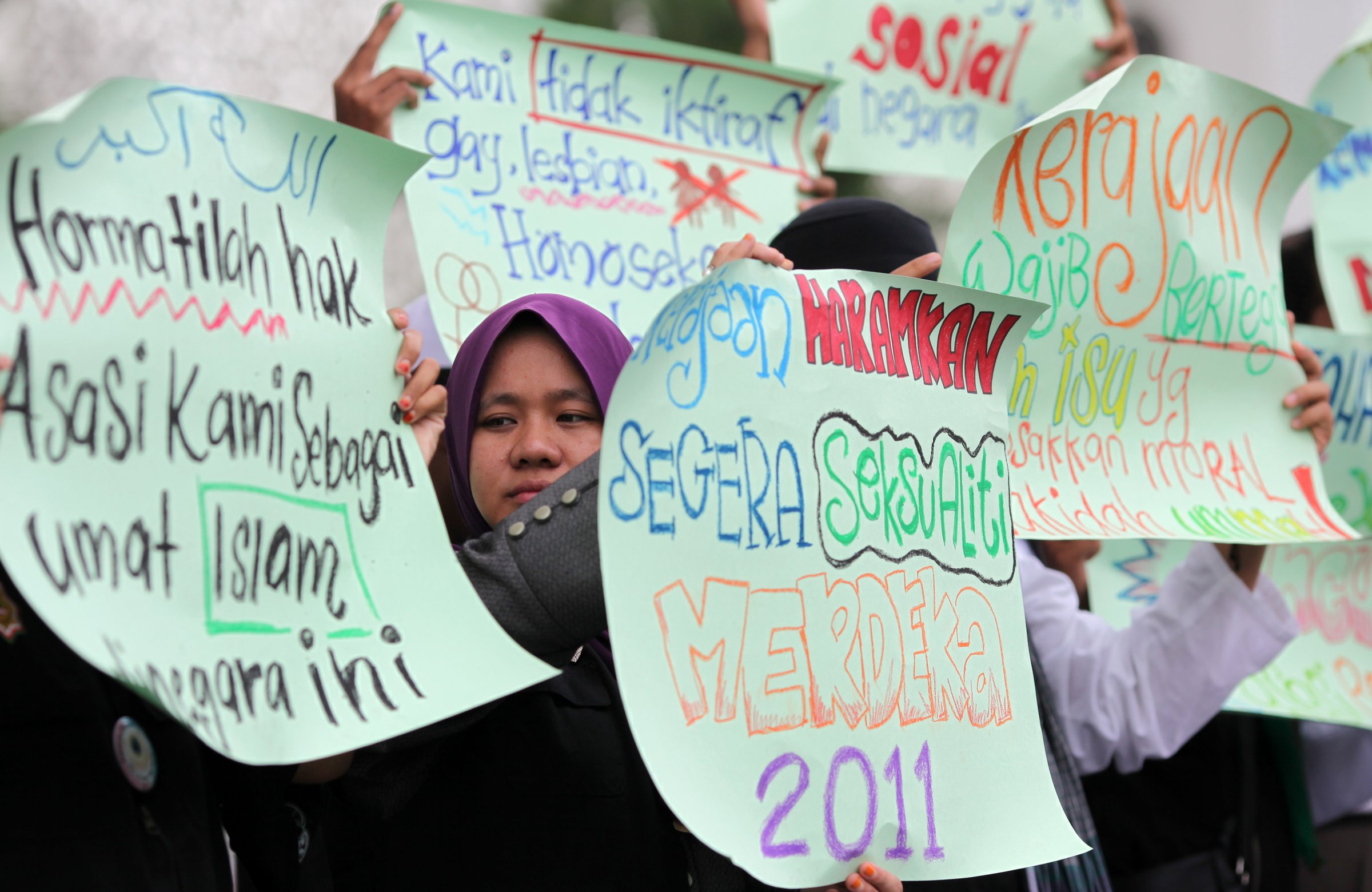
Growing religious conservatism is threatening LGTB rights in Muslim-majority nations across Southeast Asia, say activists, with a new report claiming serious abuses against Malaysia’s transgender community.
On Thursday, Human Rights Watch (HRW) published I’m Scared to Be a Woman: Human Rights Abuses Against Transgender People in Malaysia. The document makes serious allegations of physical and sexual assault committed against transgender people while in official custody.
Malaysia is a 60% Muslim nation where 13 of 15 states have invoked Shari‘a law to ban transvestism among Muslim men; three states also prohibit women “posing as men.” The statues are loosely defined and leave gaping loopholes for abuse, venality and vindictive prosecution, says HRW.
“Malaysian authorities frequently abuse transgender women at the expense of their dignity and in violation of their basic rights,” Boris Dittrich, LGBT-rights advocacy director at HRW, said in a statement. Malaysia’s Religious Department and other state officials have license to do “whatever they like” with transgender women, he added.
The 73-page report includes testimony from 42 transgender women, three transgender men and 21 other medical professionals, legal representatives, activists and outreach workers.
Victoria, a transwoman from Negeri Sembilan state, told HRW she was “completely humiliated” when Religious Department officials photographed her naked while under arrest in 2011. “They were rough,” she said. “One of them squeezed my breasts. One of them took a police baton and poked at my genitals.”
Gender-reassignment surgery was once available in Malaysia, but rising Islamic conservatism led to a ban issued by the National Fatwa Council in 1982. Thus many transgender people undergo medical transitioning in neighboring Thailand, but this leaves them in legal limbo upon their return.
Such problems are not limited to Malaysia. Brunei recently adopted a Shari‘a penal code, with draconian sanctions such as death by stoning for adulterers and flogging or even death for homosexual acts. The code applies the death penalty to both Muslims and non-Muslims in the case of adultery and sodomy, says the International Council of Jurists, despite official claims that non-Muslims will not be subjected to Shari‘a.
In Indonesia, the world’s largest Muslim nation, the semiautonomous state of Aceh is also adopting increasingly harsh interpretations of Shari‘a. A draft bylaw announced this week would punish anal sex between men and “the rubbing of body parts between women for stimulation” with 100 lashes. The law would also apply to non-Muslims.
“We have studied the implementation of Shari‘a in countries like Saudi Arabia, Brunei Darussalam and Jordan to draft this law and we are happy with it,” said Ramli Sulaiman, an Aceh lawmaker who led the drafting commission, reports AFP.
Other states in Indonesia only use Shari‘a for civil matters such as divorce and alimony. But since 2006, an increasing number of districts have issued local ordinances based on Shari‘a to govern social conduct. Although many of these are unconstitutional, the central government often fails to decisively strike them down for political reasons, says Freedom House.
According to Faisal Riza, an activist for the Violet Grey LGBT advocacy group, who hails from Aceh but is now based in the Indonesian capital, Jakarta, Shari‘a law makes “society feel free to take action or use violence against LGBT people, especially transgender people.”
Discrimination is “getting worse,” he tells TIME, and is exacerbated by “lack of formal education and job access, so some [transgender people] become sex workers.” Possession of condoms is often deemed evidence of prostitution, leaving another window open for abuse and corruption, as well as hampering efforts to tackle the spread of communicable disease, including HIV/AIDS.
In Malaysia, LGBT activists hope an upcoming court case may give them some legal protection. Following the arrest of 16 transgender women at a wedding party in the western coast state of Negeri Sembilan in June, four applicants are claiming that local Shari‘a law is incompatible with national and constitutional guarantees of freedom of expression, freedom of movement and equality. The Putrajaya Court of Appeal is slated to rule on the issue on Nov. 7.
“Malaysia urgently needs to scrap laws that discriminate against transgender people, adhere to international rights standards, and put in place comprehensive non-discrimination legislation that protects them,” said HRW’s Dittrich.
More Must-Reads From TIME
- The 100 Most Influential People of 2024
- The Revolution of Yulia Navalnaya
- 6 Compliments That Land Every Time
- What's the Deal With the Bitcoin Halving?
- If You're Dating Right Now , You're Brave: Column
- The AI That Could Heal a Divided Internet
- Fallout Is a Brilliant Model for the Future of Video Game Adaptations
- Want Weekly Recs on What to Watch, Read, and More? Sign Up for Worth Your Time
Write to Charlie Campbell at charlie.campbell@time.com